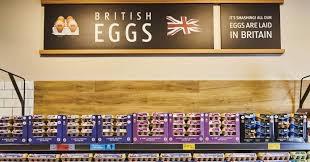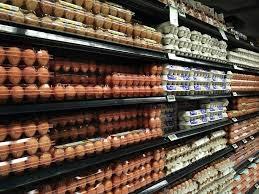
Promotion of U.K. - produced eggs |
According to the British Free-Range Egg Producers Association (BFREPA), independent farmers are operating in a squeeze between increasing costs for feed and energy that cannot be reclaimed by increased unit revenue. Due to avian influenza restrictions, free-range flocks are now required to be confined and since supermarkets are required to market these eggs as “barn-housed”, prices received by producers are not proportional to cost. A survey among U.K. free-range egg producers indicated that at least one third of members of the BFREPA have either reduced flock size or ceased production. Notwithstanding, the diminished availability of the category, supermarkets maintain that supply is adequate in relation to seasonal demand.

The current situation demonstrates the reality that demand and supply are inextricably linked. Neither price to consumers nor payment by supermarket chains or packers are influenced by the cost of production. The old adage that “low prices are the cure for low prices” will ultimately create equilibrium between supply from conventional and free-range production and demand for individual categories. Supermarkets and packers will naturally attempt to maximize margin and consumption will be determined by willingness to pay for attributes claimed for egg categories. A possible reason why retailers are disinclined to pay more for barn-housed but previously free-ranged eggs, is that this category is available both from domestic U.K. producers and from imports. Given the economic downturn in the U.K. and excessive inflation with rates almost double that of the U.S., consumers are extremely price-conscious and are seeking eggs at the lowest cost, unwilling to pay for non-quantifiable and subjective attributes such as “welfare”, “country of origin” and “family-farm production”.
The question arises as to whether the U.K. experience has a lesson for our industry?